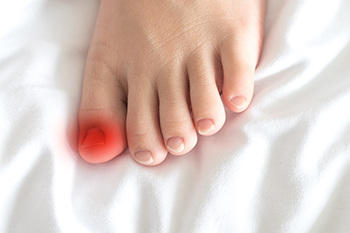
An ingrown toenail occurs when the edge or corner of a toenail grows into the surrounding skin, leading to pain, redness, and swelling. Causes can include improper nail trimming, wearing tight-fitting shoes, or sustaining foot trauma. If left untreated, ingrown toenails can escalate, causing infection. Bacteria can enter through the broken skin, leading to pus formation and further inflammation. In severe cases, untreated infections may spread beyond the toe, causing cellulitis or even a bone infection. Chronic ingrown toenails can also lead to recurrent pain and discomfort, affecting daily activities. Proper toenail care, including trimming nails straight across and wearing well-fitted shoes, can help to prevent ingrown toenails. If you have developed an ingrown toenail, it is suggested that you consult a podiatrist who can offer safe and effective treatment.
Ingrown toenails can become painful if they are not treated properly. For more information about ingrown toenails, contact one of our podiatrists of Nola Sole Podiatry. Our doctors can provide the care you need to keep you pain-free and on your feet.
Ingrown Toenails
Ingrown toenails occur when a toenail grows sideways into the bed of the nail, causing pain, swelling, and possibly infection.
Causes
- Bacterial infections
- Improper nail cutting such as cutting it too short or not straight across
- Trauma to the toe, such as stubbing, which causes the nail to grow back irregularly
- Ill-fitting shoes that bunch the toes too close together
- Genetic predisposition
Prevention
Because ingrown toenails are not something found outside of shoe-wearing cultures, going barefoot as often as possible will decrease the likeliness of developing ingrown toenails. Wearing proper fitting shoes and using proper cutting techniques will also help decrease your risk of developing ingrown toenails.
Treatment
Ingrown toenails are a very treatable foot condition. In minor cases, soaking the affected area in salt or antibacterial soaps will not only help with the ingrown nail itself, but also help prevent any infections from occurring. In more severe cases, surgery is an option. In either case, speaking to your podiatrist about this condition will help you get a better understanding of specific treatment options that are right for you.
If you have any questions please feel free to contact our office located in New Orleans, LA . We offer the newest diagnostic and treatment technologies for all your foot and ankle needs.
